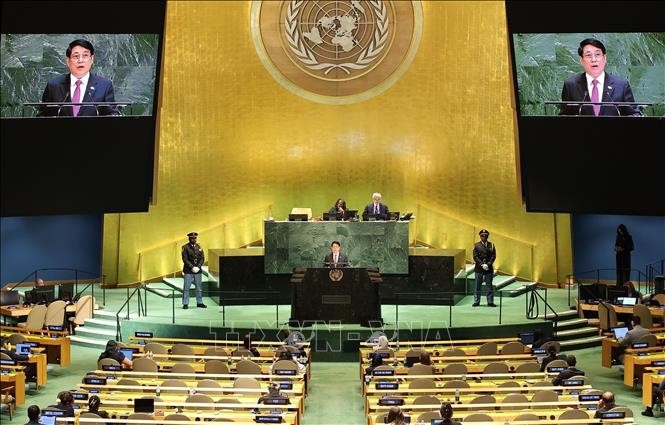In an in-depth analysis of the President’s speech at the U.N., The Washington Times highlighted Vietnam’s increasingly prominent role as a “responsible and forward-looking” nation. Vietnam’s “flexible yet steadfast” foreign policy has been highly evaluated, as it demonstrates the country’s ability to adapt while firmly upholding the fundamental principles of the UN Charter and international law. This approach has enabled Vietnam to be recognized as a “trusted guardian” of sovereignty, territorial integrity, and peaceful solutions to disputes.
    |
 |
|
State President Luong Cuong delivers remarks at the High-level General Debate of the 80th session of the United Nations General Assembly. |
Notably, The Washington Times paid particular attention to Vietnam’s orientation toward scientific and technological development, especially in the field of artificial intelligence. The article viewed this as clear evidence of how Vietnam links domestic modernization with international responsibility, by promoting the responsible development of advanced technologies rooted in ethical, security, and inclusive principles.
The newspaper also noted Vietnam’s upcoming hosting of the signing ceremony of the U.N. Convention against Cybercrime (the “Hanoi Convention”) in late October, citing it as further proof of Vietnam’s readiness to assume a constructive role in shaping global rules for the digital era.
The Washington Times further emphasized that Vietnam consistently supports U.N. reform efforts. The paper underscored that Vietnam has been proactive in initiatives to enhance the effectiveness of peacekeeping operations, ensure inclusiveness in global governance, and accelerate progress in achieving the Sustainable Development Goals (SDGs).
According to the analysis, Vietnam’s diplomacy is distinctive for its approach of “leading by consensus rather than imposition.” Instead of seeking to gain advantage through confrontation, Vietnam has chosen to promote dialogue, build trust, and strengthen international law.
Meanwhile, International Policy Digest published an article by James Borton, affirming that President Luong Cuong’s recent trip vividly illustrated Vietnam’s diplomatic policy, style and statecraft. According to the scholar, Hanoi has maintained close ties with major powers while strengthening its role within ASEAN and joining high-standard trade frameworks such as the CPTPP and the RCEP. This approach allows Vietnam to avoid binary choices in an increasingly polarized environment, while underscoring its position as a trusted partner for all sides.
Once isolated and impoverished, the country is now among Asia’s most dynamic economies, with strong manufacturing capabilities, a young and educated population, and an increasingly tech-savvy workforce, Borton said.
President Luong Cuong’s participation in UNGA 80 marks Vietnam’s shift from a reactive to a proactive role in international integration, reflecting its strategic vision of becoming a developed, high-income country by 2045.
Source: VNA